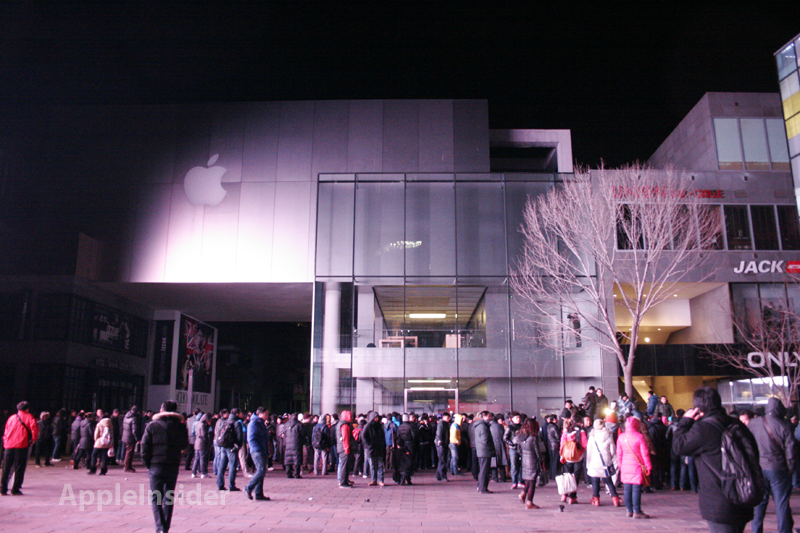Apple CFO says company sees 'no ceiling' to penetration of Chinese market
"They don’t see a ceiling," Brain Marshall, an analyst with ISI Group, said of Apple's prospects to further penetrate the Chinese market. He made the comments in a research note to clients following a conference call ISI hosted with Oppenheimer.
"Many consumers can’t yet afford a car or home but want to carry and show a great product," Marshall added.
During the call, Oppenheimer also indicated that he was 'very excited' about new retail store opportunities in China, saying Apple will be adding new stores in both Beijing and Shanghai, in addition to launching locations in several new cities.
Although Oppenheimer did not identify any particular locations, AppleInsider reported earlier this year that job listings for Apple Retail store leader positions were turning up in Shenzhen and Chengdu. Additionally, a mall in Dalian, China recently began advertising that the "world's biggest" Apple Store was set to open in the shopping center in the near future.
For Apple, expansion of its retail footprint in China can't move fast enough. The region, which now accounts for a staggering 16% of the company's overall sales, has fewer Apple retail stores than the state of Pennsylvania.
With just six stores in Greater China, Apple has one retail location per 216 million Chinese residents, whereas Pennsylvania has a total of eight stores for a population of 12.7 million people. Yet, during the company's most recently-ended fiscal quarter, sales in China rose 48% year-over-year to $5.7 billion — with Greater China represents about a third of Apple's combined 25% growth rate in all of Asia-Pacific.
Former Apple retail chief Ron Johnson said in early 2010 that Apple had plans to open a total of 25 retail stores in China in the short term, but the company has since then fallen well short of meeting that goal, potentially due to a combination of red tape issues and its 'very selective' approach to acquiring prime real estate.
After learning the iPhone 4S launch had been postponed, an unhappy crowd lingered around a Beijing Apple Store on Jan. 13.
Another issue that may have slowed Apple's retail progress in China is Johnson's departure as Apple's retail head, followed by his replacement by John Browett, the former chief executive of Dixon's, a discount UK tech retailer.
Browett was castigated by bloggers earlier this week after reports surfaced that the new retail vice president had issued orders to layoff staff in Apple's retail workforce in an effort to raise profits and presumably make a name for himself at the expense of the company's industry leading reputation for retail customer service.
Demand for Apple products in China is only expected to increase during the second half of the year, as the company last month reached a settlement to use the iPad brand in China, which cleared the way for the company's new third-generation iPad to go on sale in mainland China. Apple has already captured 70 percent of the Chinese tablet market.
In addition to his upbeat comments regarding China on Thursday, Oppenheimer reportedly exhibited "high confidence in future plans" in general, which Marshall believes is indicative a near-term launch of both the iPhone 5 and the company's next foray into the connected television segment.
ISI maintains a Buy rating and $710 price target on shares of Apple.
 Kasper Jade
Kasper Jade














 Amber Neely
Amber Neely
 Thomas Sibilly
Thomas Sibilly
 AppleInsider Staff
AppleInsider Staff
 William Gallagher
William Gallagher
 Malcolm Owen
Malcolm Owen
 Christine McKee
Christine McKee










10 Comments
[quote name="AppleInsider" url="/t/151988/apple-cfo-says-company-sees-no-ceiling-to-penetration-of-chinese-market#post_2170341"] "They don?t see a ceiling," Brain Marshall, an analyst with ISI Group, said of Apple's prospects to further penetrate the Chinese market. [/quote] sorry, as far out as it might be, there is a limit.
wow that photo is pink.
Thank you, Mr. Obvious.
But to achieve HALF the density of the stores in Pennsylvania, Apple would have to build another 405 stores in China. Even if they opened 20 locations a year, that would take them until at least 2032. And by then, you might have similar new demand in India and maybe even Africa and the Middle East, assuming that the world economy doesn't blow up again.
Hell, by then, the U.S. recession might truly be over and we might even be a growth market again.
Or...by then Apple will be old and tired and others will have come to take its place.
There is probably more chance of a ceiling in the Chinese market than in the US. In China there are probably hundreds of companies who are stealing Apple's IP and making knock offs. Another possible scenario that could happen without warning might be the government banning Apple for some political reason such as what almost killed iPad sales in the trademark fiasco.
With planned obsolescence everyone in the US will be buying a new device every two years or less. At least in the US we only have Googorola making knock offs.
"....by then, the U.S. recession might truly be over and we might even be a growth market again."
People who tend to know about these things seem to be in general agreement that the really big crash has been delayed, but it will happen at some point due to unwise monetary policy and throwing billions of devalued dollars into the economy.